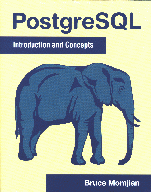
|
FreeComputerBooks.com
Links to Free Computer, Mathematics, Technical Books all over the World
|
|
- Title: PostgreSQL: Introduction and Concepts
- Author(s) Bruce Momjian
- Publisher: Pearson Education; 1st edition; eBook (Online Edition)
- Paperback: 462 pages
- eBook: HTML and PDF (490 Page, 2.6 MB)
- Language: English
- ASIN: N/A
- ISBN-10: 0201703319
- ISBN-13: 978-0201703313
- Share This:

|
This book is about POSTGRESQL, the most advanced open source database. From its origins in academia, POSTGRESQL has moved to the Internet with explosive growth. It is hard to believe the advances during the past four years under the guidance of a team of worldwide Internet developers. This book is a testament to their vision, and to the success that POSTGRESQL has become.
The book is designed to lead the reader from their first database query through the complex queries needed to solve real-world problems. No knowledge of database theory or practice is required. However, basic knowledge of operating system capabilities is expected, such as the ability to type at an operating system prompt.
Beginning with a short history of POSTGRESQL, the book moves from simple queries to the most important database commands. Common problems are covered early, which should prevent users from getting stuck with queries that fail. The author has seen many bug reports in the past few years and consequently has attempted to warn readers about the common pitfalls.
About the Authors- Bruce Momjian is co-founder and core team member of the PostgreSQL Global Development Group, and has worked on PostgreSQL since 1996. He has been employed by EnterpriseDB since 2006.

- PostgreSQL: Introduction and Concepts (Bruce Momjian)
- The Mirror Site (1) - PDF
- The Mirror Site (2) - PDF
-
 Postgres: The First Experience (Egor Rogov, et al.)
Postgres: The First Experience (Egor Rogov, et al.)
This short pamphlet provides an overview of PostgreSQL DBMS, covering the history of its development, the main features, and a product roadmap. If you are just getting started, you can use this book as a step-by-step installation and configuration guide.
-
 The Internals of PostgreSQL (Hironobu Suzuki)
The Internals of PostgreSQL (Hironobu Suzuki)
This book describes the internals of PostgreSQL for database administrators and system developers. The main purposes of this book are to explain how each subsystem works, and to provide the whole picture of PostgreSQL.
-
 PostgreSQL Internals (Egor Rogov)
PostgreSQL Internals (Egor Rogov)
Briefly touching concepts of PostgreSQL, plunges into the depths of data consistency and isolation, explaining implementation details of multiversion concurrency control and snapshot isolation, buffer cache and write-ahead log, and the locking system.
-
 Postgres Succinctly (Peter Shaw)
Postgres Succinctly (Peter Shaw)
This book provides a concise overview to help you quickly understand and use PostgreSQL's unique features. It guides you from installing Postgres, to creating your first database, to using Postgres in a .NET application with ADO .NET and Entity Framework.
-
 PostgreSQL: An Introduction (WikiBooks)
PostgreSQL: An Introduction (WikiBooks)
The purpose of this book is an introduction to the PostgreSQL specific aspects: its architecture, installing procedure, maintenance and optimization tasks. Thus it is primarily aimed to database administrators.
-
 O'Reilly® Practical PostgreSQL (John C. Worsley, et al)
O'Reilly® Practical PostgreSQL (John C. Worsley, et al)
This comprehensive new volume shows you how to compile PostgreSQL from source, create a database, and configure PostgreSQL to accept client-server connections. It also covers the many advanced features.
-
 PostgreSQL Notes for Professionals (Goalkicker)
PostgreSQL Notes for Professionals (Goalkicker)
This book is the definitive guide to undocumented and partially-documented features of the PostgreSQL server. It helps you learn to apply the right solution at the right time, about avoiding risk, about making robust choices related to PostgreSQL databases.
-
 PostgreSQL Tutorials
PostgreSQL Tutorials
These tutorials offer readers a thorough overview of database basics, starting with an explanation of why you might need to use a PostgreSQL database, and following with a summary of what different database types have to offer when compared to alternatives like spreadsheets.






